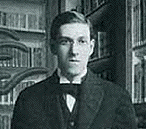August 20: H.P. Lovecraft
H.P. Lovecraft (1890)
It was on this date, August 20, 1890, that American author Howard Phillips Lovecraft, who wrote as H.P. Lovecraft, was born in Providence, Rhode Island. Fatherless from the age of three, Lovecraft was reared by his mother and grandparents, and it was his grandmother who held him spellbound with weird tales that inspired some of his own fantasy fiction. Lovecraft was also fascinated with the Tales of the Arabian Nights and Greek mythology. In his biography, L. Sprague De Camp says,
At five, [Lovecraft read] ... a junior edition of The Arabian Nights. He at once fell in love with the glories of medieval Islam and spent hours playing Arab. ... One effect of dabbling in non-Christian traditions was to make Lovecraft skeptical of the faith of his fathers. Before he reached his fifth birthday anniversary, young Lovecraft announced that he no longer believed in Santa Claus. Further private thought convinced him that arguments for the existence of God suffered the same weaknesses as those for Santa.
De Camp goes on to describe how, as a five-year-old Sunday school student in the First Baptist Meeting House on College Hill, Lovecraft was introduced to the story of Christians being thrown to the lions in ancient Rome – the teacher neglected to mention that Rome had been ruled by Christian emperors for a century – and that the results were not what the elders expected: Lovecraft shocked the class by gleefully taking the side of the lions!
Writing of the experience himself, Lovecraft says,
The absurdity of the myths I was called upon to accept and the sombre greyness of the whole faith compared with the Eastern magnificence of Mahometanism, made me definitely an agnostic; and caused me to become so pestiferous a questioner that I was permitted to discontinue attendance. ... My grandfather had travelled observingly through Italy, and delighted me with long, first-hand accounts of its beauties and memorials of ancient grandeur. I mention this aesthetic tendency in detail only to lead up to its philosophical result – my last flickering of religious belief.
De Camp sums up,
...His skeptical view of the supernatural – his nontheism – and his love of the Classical world were not the only lasting passions formed in his childhood. ... he embraced eighteenth-century rationalism, which confirmed him in his atheistic materialism.
In his own words, in a letter to fellow writer Clark Ashton Smith (10/9/1925), Lovecraft said, “I am, indeed, an absolute materialist so far as actual belief goes; with not a shred of credence in any form of supernaturalism—religion, spiritualism, transcendentalism, metempsychosis, or immortality.” His writings included a hundred historical, science fiction, and fantasy novels, and at least 100,000 letters to various correspondents. Yet the author never had a book of stories published during his lifetime. H.P. Lovecraft become successful only after his death, on 15 March 1937.
* H.P. Lovecraft; A Biography, L. Sprague De Camp, 1996, pages 19-24.
Originally published August 2003 by Ronald Bruce Meyer.


